 | William Smyth - 1830 - 278 pages
...these numbers ; this would be a table of logarithms. We define the logarithm of a number therefore, the exponent of the power, to which it is necessary to raise a given or invariable number, in order to produce the proposed number. Thus in the equation a* = y,... | |
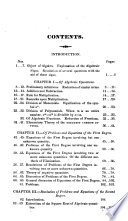 | Bourdon (M., Louis Pierre Marie) - 1831 - 446 pages
...number, to form all these numbers, an idea will be had cf a table of logarithms. The logarithm of a number, is the exponent of the power, to which it is necessary to raisj a certain invariable number, in order to produce the first number. The invariable number may... | |
 | Bourdon (M., Louis Pierre Marie) - 1831 - 326 pages
...numbers; we shall then have an idea of a table of logarithms. We generally call the logarithm of a number the exponent of the power to which it is necessary to raise a certain invariable number, in order to produce the first number. The invariable number may at first... | |
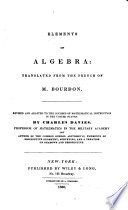 | Charles Davies - 1835 - 378 pages
...to form all these numbers, an idea will be had of a table of logarithms. Hence, The logarithm of a number, is the exponent of the power to which it is necessary to raise a certain invariable number, in order to produce thefirst number. Any number, except 1, may be taken... | |
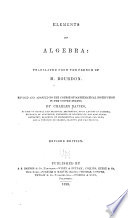 | 1838 - 372 pages
...to form all these numbers, an idea will be had of a table of logarithms, Hence, The logarithm of a number, is the exponent of the power to which it is necessary to raise a certain invariable number, in order to produce thefrst number. Any number, except 1, may be taken... | |
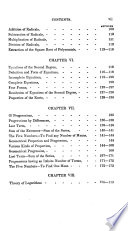 | Charles Davies - 1842 - 284 pages
...if we make m=0, M will be equal to 1; if wi=l, M will be equal to 10, &.C. Hence, The logarithm of a number is the exponent of the power to which it is necessary to raise the base of the system in order to produce the number. 1 76. Letting, as before, a denote the base... | |
 | Charles Davies - 1842 - 368 pages
...to form all these numbers, an idea will be had of a table of logarithms. Hence, The logarithm of a number, is the exponent of the power to which it is necessary to raise a certain invariable number, in order to produce thefirst number. Any number, except 1, may be taken... | |
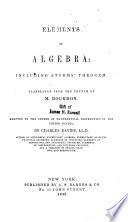 | Charles Davies - 1845 - 382 pages
...the invariable number a is called the bose of that system of logarithms. Hence, The logarithm of a number, is the exponent of the power to which it is necessary to raise an invariable number, called the base of the system, in order to produce the number. The general properties... | |
 | Charles Davies - 1850 - 292 pages
...if we make m=0, M will be equal to 1; if w=l, M will be equal to 10, &,c. Hence, The logarithm of a number is the exponent of the power to which it is necessary to raise the base of the system in order to produce the number. 1 TO. Letting, as before, a denote the base... | |
 | William Smyth - 1851 - 272 pages
...possible values of N. In this equation, x is the logarithm of N. And in general, the logarithm of a number is the exponent of the power to which it is necessary to raise an invariable number talcen as a base, in order to produce the number. Supposing a table of logarithms... | |
| |